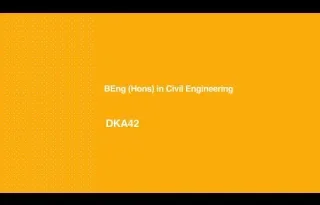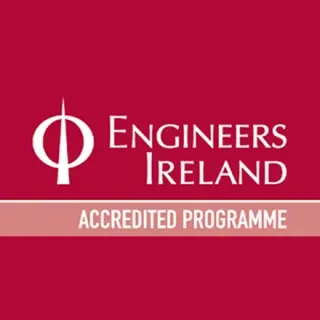Bachelor of Engineering in Civil Engineering

Search to find a different course
Course Overview
This course emphasises civil engineering design and practice, by developing specialised and in-demand industry skills. Students manage and design projects of all scales as individuals and as part of teams, on topics such as Fluid Mechanics, Highway Engineering, Structural Mechanics, and CAD.
The course develops each student’s civil engineering knowledge, know-how skill, and competence, and the confidence to effectively take on the role of the civil engineering technologist.
This course is designed to develop students' ability to apply engineering principles and technologies to solve problems in civil engineering works' investigation, planning, design, construction, operation, and maintenance.
Students in this course will acquire skills in the following areas: Civil engineering drawing and detailing, materials specification and testing, surveying and setting out; Measurement and costing of civil engineering work, document preparation and interpretation, and computer-aided analysis, design, and draughting.
What makes this course different
Opportunity to Transfer
At the end of Year 1 students who achieve the required results will have the opportunity to transfer to the second year of the BEng (Hons) Level 8 in Civil Engineering.
Excellent Career Prospects
90% of graduates in employment or further study after 6 months of graduation. 78% earning up to €50k after 6 months of graduating. (DkIT/HEA survey).
Engineers Ireland Accreditation
This course has Engineers Ireland accreditation to Associate Engineer level, A.Eng., which is internationally recognised.
Understanding the Industry
Civil engineering is about protecting, creating, and improving our everyday environment. It involves the planning, design, and construction of facilities that we require for living, for industry and for transport; roads, bridges, buildings, railway, airports, water supply, drainage, flood management and sustainable energy schemes such as wind farms, ocean energy or hydroelectric stations.
Career Opportunities
Future Careers:
- Consulting civil engineer
- Contracting civil engineer
- Estimator
- Structural engineer
- Water engineer
In these areas:
- Engineering
- Construction
- Water Service
Graduates work at



Course Delivery and Modules
Compared to the more mathematical BEng (Hons) courses this course places more emphasis on civil engineering design and practice. This develops graduates with a demonstrated capacity to instantly become productive members of any working environment. The portfolio of work produced during the course allows graduates to show prospective employers their capabilities and scope of knowledge.
- Civil Engineering Construction 1
- Materials Technology
- Mathematics 1
- Professional Practice
- Surveying 1
- Mathematics 2
- Civil Engineering Construction 2
- Civil Engineering Science
- Computer-Aided Design 1
- Statics
- Surveying 2
- CAD and Computer Applications
- Civil Engineering Construction 3
- Environmental Engineering 1
- Mathematics 2
- Structural Design 1
- Structural Mechanics
- Mathematics 3
- Civil Project Management 1
- Fluid Mechanics
- Soil Mechanics
- Structural Detailing
- Surveying 3
- Data Analysis and Probability
- Environmental Engineering 2
- Geomatics for Engineers
- Highway and Traffic Engineering
- Project 1 - Group Design Project
- Structural Design 2
- Civil Project Management 2
- Geotechnical Engineering 1
- Hydrology
- Numerical Analysis
- Project 2 - Individual Project
- Structural Analysis
Professional Accreditations
Engineers Ireland accreditation
This course is recognised by Engineers Ireland as meeting international standards commensurate with Associate Engineer (A. Eng) standing.
Engineers Ireland’s accreditation is an objective evaluation and approval of third level engineering programmes, ensuring that they meet international standards, the needs of the engineering profession and broader responsibilities to society, environment and economy.
Accreditation is a periodic assessment of a programme of engineering education against accepted standards. The hallmark of a professional engineer is the ability to apply the learning outcomes gained during study to real world situations. These are assessed as working experiences or learned competences.
Graduates of accredited programmes, at the appropriate standard, may go on to achieve one of the professional titles of Chartered Engineer, Associate Engineer and Engineering Technician. Find out more about the Engineers Ireland Accreditation Criteria.

Education Progression
At the end of Year 1 students who achieve a GPA of 70%+ with an average mark of 70%+ in both Mathematics modules will have the opportunity to transfer from the Level 7 course to the second year of the Bachelor of Engineering (Hons) in Civil Engineering.
On completion of this course, students will be eligible to transfer to Year 4 of the Level 8 course: BEng (Hons) Level 8 in Civil Engineering, or the BSc (Hons) in Engineering Entrepreneurship Add-on or BSc (Hons) in Civil Engineering Add-on. (This will be subject to student numbers. Where places are limited, offers will be linked to the final GPA achieved.)
Bachelor of Engineering (Hons) in Civil Engineering
BEng (Hons) in Civil and Environmental Engineering (Full-time Level 8 Add-On)
BSc (Hons) in Engineering Entrepreneurship
Fees and Funding
Please find information on fees and funding here.
Entry requirements
Standard entry requirements apply. There are no special entry requirements for this course.
- Standard Requirements for Leaving Certificate Applicants
- Standard Requirements for UK/NI Applicants
- Standard Requirements for QQI-Further Education Applicants
Recent CAO points
How to apply
Apply on CAO
All standard entry first-year applicants must apply for entry through the CAO. See Important application dates for CAO and information for specific applicant types below:
Advanced Entry & Transfer Applications
Advanced Entry is for applicants who have previous educational achievements and/or work experience and want to be considered for direct entry into year 2, 3, or 4 of a course. This includes students looking to transfer to DkIT from another Higher Education provider.
International Application (non-EU)
International Applicants (not from or living in the EU) can apply through an agent or directly to DkIT to study this course.
Ask us a Question
If you have a question about the Bachelor of Engineering in Civil Engineering please ask it below and we will get back to you.
Disclaimer: All module titles are subject to change and for indicative purposes only. All courses are delivered subject to demand and timetables are subject to change. Elective Module options will only run subject to student numbers. The relevant Department will determine the viability of each elective module option proceeding depending on the number of students who choose that option. Students will be offered alternative elective modules on their programme should their preferred elective option not be proceeding. Award Options for Common Entry Programmes: The relevant Department will determine the viability of each award option proceeding depending on the number of students who choose either option. If the numbers for one of the Award options exceed available places, students for this option will be selected based on Academic Merit (highest grades).


